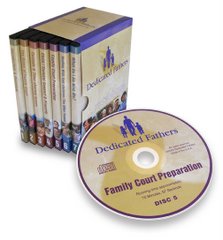LEARNING THE “GAME” OF FAMILY COURT
www.dedicatedfathers.org
Each state has its own particular laws, customs, precedent setting cases and local rules when it comes to divorce and child custody.. With this caution in mind, the following is an overall education with some general information on issues you may want to ponder when heading into the family court arena.
For many people their first experience with any court is when they experience family court. For many people the family court, divorce, and child custody experience can be devastating. Not only can you lose a good portion of your income, it is also the place where the parents learn when, where and how they will “be allowed” to have time with their children.
After watching numerous television shows featuring attorneys and the court system, many people have preconceived notions about fairness in family courts. The reality is, like any court today, the calendar is packed and relatively little time is devoted to each individual case. Therefore, justice and fairness almost always give way to expediency, which in family law means the orders will be based on biases, prejudices and "feelings," rather than fact, equity and fairness. As a result, both mothers and fathers are usually greatly discouraged and dismayed when they exit the family court system.
The first notion a person needs to understand is that family law is a game. Let’s take a look at just two games:
1. If you walk into your local convenience store and pick up a bag of chips and walk out without paying for them, it’s called “stealing.”
Action: Stealing
Results: Time in jail
2. If you are on first base in a baseball game and you run down to second base, this is also called “stealing” (assuming you are safe at second base).
Action: Stealing
Results: You’re a hero
In both of these games the “Action” is the same: “Stealing.”
3. Question: Why such different “Results” when the “Action” is the same?
4. Answer: Different game - Different sets of rules.
In the game of life, stealing is a crime which will land you in jail. In the game of baseball, stealing is advantages and will make you a hero.
Treating the “game” of family court with the same rules as the “game” of life (truth, justice, honesty, integrity, fairness and equality) would be like playing baseball with the same rules as the game of life (refusing to steal a base because it is against your principles to steal).
Just as it would not make sense to play the game of baseball by the rules in the game of life, it does not make sense to play the game of family law by the rules of the game of life.
You need to know the game you are playing, you need to know about family court.
Family court has also been referred to as being like a game of chess: You need to anticipate the other players move BEFORE they make it. Just like in chess, never, ever play defensively - you’ll be a guaranteed “loser” in family court if you start playing defensively.
Preparation is the most important key to playing the game of family court. Organizing and managing your divorce or child custody case must be your top priority. Do not expect or assume your attorney (if you have one) will be organized or particularly adept at case management. Remember, attorneys went to law school to become litigators to “win” for their clients. You need to stay on top of all issues in your case. You must know and understand your case inside and out.
Family court is a multi-billion dollar business and a big part of the “game” is money. Find this hard to believe? Visit your nearest family court. You will discover the judge sits on the bench for about six (6) hours a day, with as few as 20, to as many as 45 or more cases to hear each day. This translates into about 15 minutes per case.
This literally means your financial future (support) and the amount of time you are allowed to be with your children (custody and visitation) may be decided in 15 minutes or less. If anyone really cared about you, your ex or your children, could they make significant determinations about your life in 15 minutes or less? Again, if you find this notion hard to believe, simply visit your nearest family court, watch a divorce or child custody hearing and see what happens.
While it is true more time is allowed for final “trials;” in most states, the only thing “final” about the final trial is that your status is changed from being married to being single, and your property has been divided. Almost all other issues are open for later interpretations, modifications and future court hearings.
Generally, the issues of custody, visitation and child support are almost always open for future modifications - and those are the hearings which last 15 minutes or less. Again, if someone really cared about you and your reorganizing family, could they make major decisions about your life in as little as 15 minutes?
If money were not the bottom line in family court, it would have been taken out of the adversarial system long ago. Comparatively, there is little money in education, information, mediation, negotiations and collaboration. As in every other area of life, when money becomes more important than people, then truth, justice, honesty, fairness, equality and freedom are sacrificed. Such is the case in family court.
In family court, the family unit, the restructuring of the family, and the needs of individual family members are all sacrificed on the alter of making money. Greed is a great motivator.
Currently, we are stuck with family court being under the umbrella of the adversarial system. Since this is your life, your relationship with your children, and your financial future being decided, you need to retain the role of decision-maker in your case at all times. Although you may retain an attorney or have someone whom you trust as coach, your primary job is to make decisions about your life.
NEVER FORGET
Only you, the other parent and your children will have to live with the final results from family court.
Either way the attorneys and all court related personnel will get paid.
By: Marvin Chapman
www.dedicatedfathers.org
www.unitedfathers.org
Saturday, December 16, 2006
LEARNING THE “GAME” OF FAMILY COURT
Posted by
Dedicated Father
at
4:33 PM
0
comments
![]()
Labels: case, child custody, child support, collaborative divorce, counseling, divorce, family court, law, legal
Family Court and Divorce within the Adversarial system
FAMILY COURT (DIVORCE) WITHIN THE ADVERSARIAL SYSTEM
www.dedicatedfathers.org
Family courts are governed individually by each state, with each state having its own peculiar laws, precedent setting cases and local rules. However, one common thread is no-fault divorce, now the law in one form or another in almost all 50 states.
No-fault divorce simply means one party is not required to prove fault (guilty of some type of misconduct such as adultery or abuse) on the part of the other party in order to justify filing for divorce. Generally, all a person has to say is something like they believe their marriage is irretrievably broken due to irreconcilable differences and a divorce will be granted. Maybe more accurately, no-fault divorce has also been called unilateral divorce because no-fault allows either party, at any time, for any reason (or for no reason at all) to obtain a divorce.
In family court, the "must win" attitude of the adversarial process serves to perpetuate and exacerbate the parental conflict. When the attorney prepares the stage to “win” for their client, they are simultaneously appealing to their client’s sense of justice, vindication and validation. In this adversarial process, parents learn (or are taught by their attorneys) that in order to “win” in family court, they must cast the other parent in a significant bad light.
This “must win” attitude then provides the justification needed for one parent to verbally tear the other parent apart through false allegations of physical or sexual abuse, alcoholism, drug addition or some other form of dysfunction. The fact the party being unfairly and unjustly torn apart is the mother or father of the children involved is totally lost in the emotionally packed adversarial process of “winning at all cost.”
Therefore, in family court, the “truth” of any given situation is rarely discovered.
Generally, the only thing “discovered” in the adversarial family court process is which parent chose the better advocate.
Hopefully the above simplified overview makes the following crystal clear:
Although family court is “no fault”
If you want to be a “winner“
Family court is nothing but fault.
For more information on this topic visit:
www.dedicatedfathers.org
By: Marvin Chapman
www.unitedfathers.org
Order Dedicated Fathers Audio Series Today!
Posted by
Dedicated Father
at
4:21 PM
0
comments
![]()
Labels: case, child custody, child support, collaborative divorce, court case, divorce, family court system, fathers rights, law, legal
Monday, December 11, 2006
Preparation for your divorce and/or child custody case
Preparation for your divorce and/or child custody case
Prior to Court
www.dedicatedfathers.org
Prior to your court hearing, you need to go to the courthouse and watch how other divorce and child custody cases are conducted. If possible, go to the exact courtroom in which your case will be heard and see how the judge handles their courtroom. Watch the courtroom process and become familiar with how things are done.
Even though you were in the courtroom observing the proceedings a day or two before, on the day of your hearing make sure you tell the court clerk or bailiff your name and make sure you are in the correct courtroom.
You can never be too prepared for a divorce or child custody court hearing. Therefore, before each court appearance, review, review, review and review some more. You need to know your court documents for that hearing inside and out.
On the Court Day
Dress appropriately and comfortably. A coat and tie are not necessarily required, but slacks and a dress shirt are the minimums. You want to look good, look professional, look respectful, without looking like a million dollars.
Never, ever be late for a divorce or child custody court hearing.
Unless requested otherwise by court personnel, do not take your children to court.
Watch your behavior from the moment you get out of your car until the time you drive away from the courthouse. You never know who is watching, what they are watching and who they may be talking to - stay alert.
Do not chew gum or candy while in the courtroom.
Once in the courtroom, do not leave unless your attorney gives you the OK. Not leaving the courtroom is especially important if you are representing yourself because if they call your case and you are in the restroom, they may count you as a “non-appearance” and take your case “off calendar.”
Stand up when the judge enters the courtroom and wait until he/she sits down before you do. Making eye contact with the judge during the proceedings is OK, but do not stare. The judge is the authority of the courtroom, they make the rules (and they can change the rules without every saying a word about it, so be flexible, be prepared and be confident).
Take a pad of paper with you to your divorce or child custody court hearing so you can write down any important information such as, dates and times of continuances, temporary orders, or special instructions from the judge.
Keep your focus purposeful and directed. Do not allow yourself to become disappointed or drained by the legal process. Family court procedures can be very stressful with frustrating delays, confusing rules and unfair tactics by some attorneys. Shake off the negatives, hold on to a positive thought and keep your energy level up - this is your life, this is your child’s life, and this is you and your child’s future at stake.
Listen to what is being said and mark down on a piece of paper any lies, discrepancies or omissions in the other parent’s testimony including any of the other parent’s witnesses’ testimony. If you have an attorney, do not whisper to your attorney; instead, pass along the notes you have been writing (unless otherwise instructed by your attorney).
When testifying in your divorce or child custody hearing, make the assumption the judge has not read any of your file, none of your current paperwork, and therefore knows absolutely nothing about your case.
Be confident, not cocky; Be assertive, not aggressive. Give an impression of confidence in yourself and your abilities as a parent.
Anytime the judge speaks to you, respond in a pleasant and polite manner.
Do not whisper or talk while the judge is talking. Never, ever make faces, gestures or remarks in response to what was said by the other parent, their attorney, a witness, or the judge. Have your best happy and confident poker face firmly planted.
Obviously, never lose your temper in front of the judge - no matter what happens, no matter what is said, no matter was is done. Stay calm, in control and confident even under extreme stress and duress. Do not get into arguments or make unseemly remarks to anyone in the court or in the halls or any surrounding area before, during or after the hearing or any breaks during the hearing.
When questioned by the judge or attorneys, keep your answers short and to the point. Never volunteer any information whatsoever. If you have an attorney, always look to your attorney before answering any questions - allowing your attorney time to object to the questioning if they need to.
In California, you will want to take a self-addressed-stamped-envelope (SASE) to give to the court clerk to mail you a copy of the Minute Order from your divorce or child custody hearing. This will save you a trip back to the courthouse later to pick up your Minute Order.
www.dedicatedfathers.org
By: Marvin Chapman
www.unitedfathers.org
Posted by
Dedicated Father
at
1:03 PM
246
comments
![]()
Labels: attorneys, case, child custody, child support, collaborative divorce, court case, divorce, family court, family court system, law, legal, mediation
Thursday, December 7, 2006
Family Court: Steps in preparing for your case

Steps in Preparing Your Case
www.dedicatedfathers.org
Step 1: KEEPING A JOURNAL
Immediately upon knowing you will be going into family court (or when you think you are heading into family court), one of the first and most important things you need to start doing is keeping journal of all significant events concerning you, your children, your finances and the other parent.
More often than not, each time you go to your divorce or child custody hearings you will need to provide a statement as to specifically what you want and justification for why you should get it. This written statement is called your “declaration.” The information in your declaration is taken directly from your written journal as outlined above.
In family court, some judges will not listen to what you have to say verbally. They will rely totally on what you have written in your papers and what the other parent has written in their responsive papers. Therefore, writing your declaration may be a very critical part of whether or not you get what you are asking for, which makes your journal entries extremely important to your case.
Step 2: PREPARING TO WRITE YOUR DECLARATION
Stay away from bringing up negative issues about the other parent, it usually makes you and not the other parent, look bad in the eyes of the court. However, many times in response to issues raised by the other parent, you will need to respond by bring up negative issues. Likewise, many times the only way to show a substantial change of circumstances affecting the best interest of your child is to bring up negative issues about the other parent. However, be very careful in the way you bring up those negative issues.
Only bring up negative issues IF you can show, demonstrate or prove how it directly affects your child or your relationship with your child - otherwise, leave it alone.
The cardinal rule of bringing up negative issues is that you always, always, always, label the negative issues as “CONCERNS.” Example: “I am concerned that every time I go to pick up our child, the other parent is never at home. I believe this confuses our child and allows our child to believe I have not come to see them and do not care about them, which is simply not true and not in our child’s best interests.”
Step 3: WRITING YOUR DECLARATION
Your declaration is simply your very clearly written statement of what has happened, including all dates whenever possible, which clearly provide the court with the reasons and justifications for the order you want the court to make. Every request you make needs to have a reason or justification for it. The judge knows absolutely nothing about you or your case. You need to bring the judge up to speed about your case very quickly (they don’t have much time to review each case, maybe 5 to 10 minutes at most).
Whenever possible, attach proof or evidence which supports what you are writing. If you do not have the proof or evidence, then state where such evidence is located. Some ideas as to proof or evidence may be pictures of you and your children enjoying your time together, statements from witnesses who have seen you interact with your children, time cards showing when you actually work, letters from teachers or church leaders as to your involvement with school and church. Get creative, but be able to back up your claims.
Step 4: THE COURT FILE
You will want to ensure you have an exact copy of the court file, which you can get from the County Clerk at your family courthouse. Your court file is needed so whomever is assisting you can see what has happened so far in your case.
Also, there are many times wherein something which has happened before will prevent you from bringing up the same issues again - a review of your court file will let you know this information. Additionally, there are many times wherein new or different paperwork is required based on what has happened before - again, a review of your court file will let you know this information.
Therefore, you will want to keep and maintain an up-to-date court file at all times.
Step 5: CHILD SUPPORT AND SPOUSAL SUPPORT (ALIMONY)
It is in your best interests to start getting copies of all canceled checks made for any kind of support you have paid and ensure you make copies of both the front and the back of those checks. Additionally, ensure you put on the check itself on the bottom left hand “comments” section that the check is for “child support” or “spousal support.”
Remember: IF YOU CAN’T PROVE YOU HAVE PAID IT, YOU OWE IT !
Never, ever pay any type of support in cash. Why? Because there is no way to prove the other parent received the money if you do not have a copy of the other parent’s signature and deposit notations from your canceled check.
Step 6: MAINTAIN ORGANIZED FILES OF EVERYTHING
You will eventually have numerous files about your divorce or child custody case which you will want to maintain and keep organized at all times. Some of the files you will want to keep are as follows:
A) One file for all correspondence with the other parent kept in chronological
order;
B) One file for all correspondence with your attorney and/or paralegal kept in
chronological order;
C) One file for all correspondence with the other parent’s attorney kept in
chronological order;
D) One file for all correspondence with the state agency collecting support
payments kept in chronological order; and
E) One file of all proof of all payments made for support (including both the front and the back of canceled checks).
Step 7: CONSULTATION WITH AN ATTORNEY AND/OR PARALEGAL
Armed with all of the information as outlined in Step 1 through Step 6 above, you are now ready to consult with an attorney, paralegal and or support organization about your divorce or child custody case.
One last thing:
"Not everything that is faced can be changed, but nothing can be changed until
it is faced." ---James Baldwin
By: Marvin Chapman
www.unitedfathers.org
Click here to order Dedicated Fathers today!
Posted by
Dedicated Father
at
11:34 AM
15
comments
![]()
Labels: alimony, attorneys, case, child custody, child support, collaborative divorce, counseling, court case, declaration, divorce, family court, fathers rights, journal, judgement, law, legal, paralegal


















